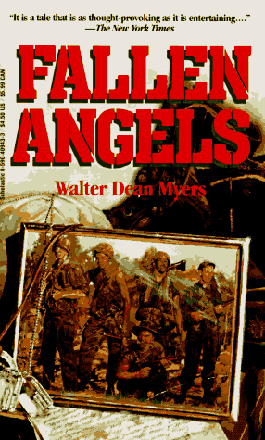 Walter Dean Myers
Walter Dean MyersFallen Angel
Reviewed by Tammy L. Currier Teens Read.com
From the mean streets of Harlem to the rice paddies and jungles of Vietnam, Walter Dean Myers's critically acclaimed FALLEN ANGELS is the riveting account of one soldier's tour of duty. Just out of high school, 17-year-old Richie Perry is fresh out of prospects. He has no money for college and the streets of Harlem are a dead-end.
Hoping for something to do, three square meals a day, and the chance to send a little money home to his mama and younger brother, Richie enlists in the army. But no one prepares him for Nam Rot…or watching your friends die…or what it feels like to kill…or the heat, humidity, and mosquitoes…or the napalm that sucks the air from your lungs at a hundred yards…or the smells of blood, cordite, burning flesh, puke and urine…or the ever-present body bags just waiting to be filled.
Graphic and realistic, Richie's first-person narrative provides the kind of immediacy lacking in most war stories. Dedicated to the older brother he lost during the Vietnam War, Myers's FALLEN ANGELS is both a tribute and testament to the thousands of young people who fought and died in the jungles of Vietnam.
Unique Perspective

Brown Plans to Make Good?
BOSTON, Oct. 18 — Extensively documenting Brown University’s 18th-century ties to slavery, a university committee called Wednesday for the institution to make amends by building a memorial, creating a center for the study of slavery and injustice and increasing efforts to recruit minority students, particularly from Africa and the West Indies.
The Committee on Slavery and Justice, appointed three years ago by Brown’s president, Ruth J. Simmons, a great-granddaughter of slaves who is the first black president of an Ivy League institution, said in a report: “We cannot change the past. But an institution can hold itself accountable for the past, accepting its burdens and responsibilities along with its benefits and privileges.” more
The report added, “In the present instance this means acknowledging and taking responsibility for Brown’s part in grievous crimes.”
The committee did not call for outright reparations, an idea that has support among some African-Americans and was a controversial issue at Brown several years ago. But the committee’s chairman, James T. Campbell, a history professor at Brown, said he believed the recommendations “are substantive and do indeed represent a form of repair.”
The committee also recommended that the university publicly and persistently acknowledge its slave ties, including during freshmen orientation. Dr. Campbell said he believed that the recommendations, if carried out, would represent a more concrete effort than that of any other American university to make amends for ties to slavery.
“I think it is unprecedented,” Dr. Campbell said, adding that a few other universities and colleges have established memorials, study programs or issued apologies, but not on the scale of the Brown recommendations. It was not clear how much the committee’s recommendations would cost to carry out.
“We’re not making a claim that somehow Brown is uniquely guilty,” Dr. Campbell said. “I think we’re making a claim that this is an aspect of our history that not anyone has fully come to terms with. This is a critical step in allowing an institution to move forward.”
Even in the North, a number of universities have ties to slavery. Harvard Law School was endowed by money its founder earned selling slaves for the sugar cane fields of Antigua. And at Yale, three scholars reported in 2001 that the university relied on slave-trading money for its first scholarships, endowed professorship and library endowment.
Dr. Simmons issued a letter in response to the report, soliciting comments from the Brown community and saying she had asked for the findings to be discussed at an open forum. She declined to give her own reaction, saying, “When it is appropriate to do so, I will issue a university response to the recommendations and suggest what we might do.”
She said “the committee deserves praise for demonstrating so steadfastly that there is no subject so controversial that it should not be submitted to serious study and debate.”
Initial reaction to the recommendations seemed to be appreciative.
“It sounds to me like this makes sense,” said Rhett S. Jones, a longtime professor of history and Africana studies at Brown. “I did not expect the committee would emerge saying, Well, you know, Brown should write a check.
“I never thought that was in the cards. I’m not sure I think it’s even appropriate that a university write a check, even though it’s pretty widely agreed on that Brown would not be where it is if it were not for slave money. These recommendations seem to me to be appropriate undertakings for the university.”
Brown’s ties to slavery are clear but also complex. The university’s founder, the Rev. James Manning, freed his only slave, but accepted donations from slave owners and traders, including the Brown family of Providence, R.I.. At least one of the Brown brothers, John, a treasurer of the college, was an active slave trader, but another brother, Moses, became a Quaker abolitionist, although he ran a textile factory that used cotton grown with slave labor.
University Hall, which houses Dr. Simmons’s office, was built by a crew with at least two slaves.
“Any institution in the United States that existed prior to 1865 was entangled in slavery, but the entanglements are particularly dense in Rhode Island,” Dr. Campbell said, noting that the state was the hub through which many slave ships traveled.
The issue caused friction at Brown in 2001, when the student newspaper, the Brown Daily Herald, printed a full-page advertisement produced by a conservative writer, listing “Ten Reasons Why Reparations for Slavery Is a Bad Idea And Racist Too.”
The advertisement, also run by other college newspapers, prompted protests by students who demanded that the paper pay “reparations” by donating its advertising fee or giving free advertising space to advocates of reparations.
The Brown committee was made up of 16 faculty members, students and administrators, and its research was extensive.
“The official history of Brown will have to be rewritten, entirely scrapped,” said Omer Bartov, a professor on the committee who specializes in studying the Holocaust and genocide.
The report cites examples of steps taken by other universities: a memorial unveiled last year by the University of North Carolina, a five-year program of workshops and activities at Emory University, and a 2004 vote by the faculty senate of the University of Alabama to apologize for previous faculty members having whipped slaves on campus.

Its called Complexification click here to see why
No comments:
Post a Comment